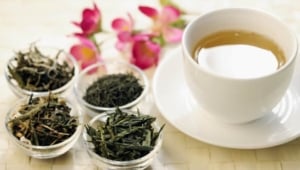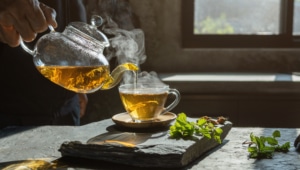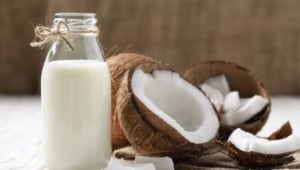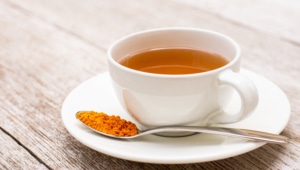Matcha Tea: 8 Health Benefits & 4 Possible Side Effects
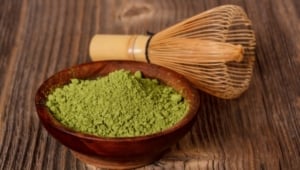
Matcha has been popular for centuries in Japan and is widely appreciated for its benefical effects: Matcha tea. In the United States, it has been hyped as a true superfood. But what’s all the excitement about green matcha tea? We get to the bottom of this question.
Matcha green tea has a slightly bitter taste and is a popular beverage. Not least because it can have many positive effects on our health. However, due to its high caffeine content, it can also cause some side effects.
What Matcha Is
Matcha could be translated from Chinese as "powdered tea" – and Matcha is nothing less. It is distinguished by its bright green color, which is an eye-catching characteristic of green tea.
The green powder is fine and tastes slightly bitter or tart.
Origin and Extraction of Matcha

Origin and extraction of matcha
Matcha is made from the Tencha tea variety, which makes up only about one percent of green tea in Japan.
In some cases, the Gyokuro, the highest quality tea variety in Japan, is also used.
Several weeks before the harvest, the tea is shaded with nets. This allows certain ingredients to accumulate, giving the tea its unique flavor. After harvesting, a large portion of the tea is processed into Matcha. In order to do this, the leaves are steamed and then dried. Next, the dried leaves are separated from the stems and processed. With the help of granite mills, the leaves are ground into a fine powder. Now the matcha powder is ready for use.
Although matcha tea is more commonly associated with Japanese culture today, it is actually of Chinese origin. At that time, various tea leaves were dried and ground into a powder for use as a medicinal herb. This method was used mainly in Buddhist monasteries in the sixth century and eventually reached Japan with the help of a Buddhist monk.
There it became part of the Japanese tea ceremony, developed in the 16th century by Sen no Rikyu. Sen no Rikyu also documented the proper preparation and drinking of matcha tea. While matcha tea gradually became an integral part of Japanese culture, it was less and less known in China.
In Buddhism, green and matcha tea are used to enhance the experience of meditation. Because green tea and especially matcha contain many activating substances, Buddhist monks can prolong and intensify their meditation practice through its use. In this country, high quality tea is mainly known for its many health benefits and is considered a healthy alternative to coffee.
How much Caffeine Matcha Tea Has
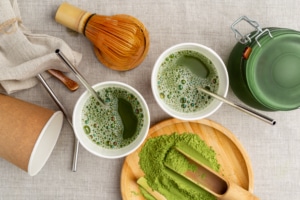
How much caffeine matcha tea has
In general, matcha contains a higher amount of caffeine than other types of green tea. This is due to the fact that the tea variety is extracted directly from the leaves of the plant.
How much caffeine your prepared matcha tea beverage will actually contain depends on several factors. On the one hand, it has to do with the type of leaf from which it is extracted. On the other hand, it also depends on how much matcha powder you use in the production process and how long you let the tea brew.
You can expect your matcha powder to contain between 20-40mg of caffeine per gram. To make a delicious cup of tea, you typically use 2-4 grams of the powder (about one to one and a half teaspoons). This would mean that your tea contains between 40-160mg of caffeine.
Experts recommend that you do not consume more than 400mg of caffeine per day. Therefore, you should not drink more than 3-4 matcha teas per day.
More information about green tea in general, you will find in this article. –> noch verlinken!
Health Benefits of Matcha – Why the Green Tea Variety Is Good for You

Health benefits of matcha – why the green tea variety is good for you
The health effects of matcha tea are a much-discussed topic. The tea variety contains many effective ingredients and is known as a true superfood precisely for this reason.
Due to the special production method and preparation form, many active ingredients are preserved that would otherwise be lost. Many ingredients are present in high concentrations, including the stimulant caffeine.
A cup of Matcha tea contains a variety of amino acids and micronutrients. In particular, the rare amino acid theanine gives green tea and especially matcha a very special effect. In addition, matcha tea contains proteins that protect the body from toxins, among other things.
There are also polyphenols such as tannin, which form an effective combination, especially in combination with the stimulating theine. Together with flavonols such as catechin, which makes up 40 percent of the dried plant, they protect the plant from potential pests. Vitamins, iron, calcium, and potassium provide a healthy all-around package.
Green Matcha Tea Gently Wakes You Up

Green matcha tea gently wakes you up
Like other green teas, matcha tea contains high levels of thein, which is a stimulant. However, unlike coffee, it does not make you jittery or shaky. Matcha tea possesses a unique combination of caffeine, theanine and tannin.
This combination allows the caffeine in the tea to work slowly and steadily to provide the perfect amount of stimulation. Unlike coffee, the effect lasts for hours and does not wear off after a short time. As a result, Matcha tea can sustainably increase concentration and performance.
More Relaxation with Matcha
Matcha tea is a stimulant, but at the same time, it can be relaxing. What sounds like a contradiction at first, however, does not necessarily have to be one. The amino acid theanine has a relaxing effect and can thus once again alleviate the nervous effect of caffeine. In addition, it has been shown to have an effect on the central nervous system. Thus, it can reduce stress and induce a relaxed state.
Matcha for Weight Loss

Matcha for weight loss
If you want to lose weight with matcha tea alone, you won’t succeed. Just a few cups of matcha tea a day cannot reduce your weight. To lose weight, you should change your diet and rethink your lifestyle. Matcha tea can help in this process. Although the tea alone is unlikely to have any effect, you can incorporate matcha tea into your diet.
The tea alone has few calories, making it an ideal diet drink. In addition, it has a stimulating effect, which can be an advantage when dieting. Some of the ingredients in Matcha tea can increase blood flow, which can help you burn more calories. Some people even report a reduced desire for desserts and fewer cravings. This may be due to the special taste of the tea and the bitter compounds it contains.
This makes matcha tea a perfect addition to a healthy diet.
Prevent Heart Disease

Prevent heart disease
A popular idea circulating about matcha tea is that it can prevent heart disease. This claim has not been confirmed, but it is possible. In a Japanese study that began in 1994, more than 40,000 people were followed for more than eleven years.
The study documented the effects of green and matcha tea on the participants' health. Each participant drank five cups of green tea per day. The researchers found that green tea consumption was associated with a lower mortality rate from cardiovascular disease.
Protection Against Cancer

Protection against cancer
Matcha tea has been linked to a preventive effect against various types of cancer. However, this has not been clearly proven. Although many studies have investigated this phenomenon, they have rarely come to a clear conclusion. There is a lack of clear evidence, although some studies have found positive results.
For example, a 2006 study conducted by the University of Parma found that substances contained in green tea may reduce the risk of prostate cancer. However, it is important not to jump to conclusions. Green tea is not yet significant in cancer prevention.
Curing Alzheimer’s and Parkinson’s
The catechins found in matcha and green tea may have a positive effect on Alzheimer’s and Parkinson’s disease. That’s the finding of a Berlin study in which researchers discovered that the substance EGCG – epigallocatechin-3-gallate – can positively influence plaque formation in Alzheimer’s and Parkinson’s disease.
Toxic protein deposits can be transformed into non-toxic ones or dissolved completely. However, many questions remain unanswered. It is unlikely that drinking a few cups of matcha tea a day will have this effect.
Ease Gastrointestinal Disorders

Ease gastrointestinal disorders
Matcha contains many ingredients that have a positive effect on the gastrointestinal tract, including tannins, calcium, and catechins. The tannin in matcha tea can soothe the stomach and intestines when they are irritated by poor diet or illness. Calcium may help prevent colon cancer,and is also present in Matcha. Catechins may also have a positive effect on gastrointestinal diseases while preserving intestinal function.
A healthy diet can prevent and alleviate many types of gastrointestinal disorders. Teas such as matcha can be especially helpful.
Unhealthy eating habits can affect the digestive system and upset the intestinal flora. If symptoms persist, it is worth changing your diet.
Matcha Tea for a Glowing Skin

Matcha tea for a glowing skin
Matcha’s effects on skin can be external as well as internal. This means that it can help the skin to glow. Some of the substances contained in matcha are known to have a positive effect on skin aging and a delicate complexion.
Here again, the catechins are the actual masterminds. Catechins are strong antioxidants. They protect against free radicals such as UV rays and cold. In this way, they can prevent skin aging and possible skin damage, and ensure radiant and healthy skin.
Possible Side Effects of Matcha Tea

Possible side effects of matcha tea
Matcha tea has few to no side effects. Occasionally it may cause intolerance, but that is the case with almost any food.
However, because matcha tea is high in caffeine, excessive caffeine-related side effects may occur. These can include:
- dizziness
- headaches
- heartburn
- diarrhea
In addition, it is recommended that matcha and green tea in general not be drunk on an empty stomach, as it can stimulate the production of stomach acid. This can cause stomach pain and nausea.
Pregnant women should avoid excessive consumption of matcha tea due to the high amount of caffeine it contains.
The catechin contained in matcha tea is also not recommended during pregnancy. However, one cup of matcha tea per day can be safely consumed during pregnancy.
Tips for The Use of Matcha
If you want to benefit from the many health-promoting effects of the colorful tea, there are a few things you should keep in mind when using the precious powder.
There are a few things you need to keep in mind during production, preparation, and storage to ensure that the active ingredients are preserved.
What Matcha Powder Is Made of

What matcha powder is made of
Matcha tea is mainly produced in Japan and China. The traditional production process of Tencha and Gyokuro, from which Matcha powder is mainly made, is characterized by shading the plants a few weeks before harvesting.
Specially made nets filter up to 90 percent of the sunlight, extending the ripening period and promoting certain growth processes in the plant. This is how the tea develops its unique and intense flavor.
Once a year the tea is harvested. The bud of the plant is picked by hand and processed as soon as possible. Typically, two tea leaves are obtained from each bud. The first step in processing is steaming. This ensures that the leaf stays fresh longer and retains its bright green color.
Next, the leaves are dried and separated from the buds and stems. Finally, the dried leaves are ground into powder. This is the most important and time-consuming step. In order to do this, the leaves are ground with mills made of granite stones. It is often the case that only a small amount of the high-quality tea is produced – only about 30 grams of matcha powder per hour.
At this point, the powder is ready to be sold and consumed.
How to Make Matcha Tea

How to make matcha tea
Matcha tea is often drunk during the Japanese tea ceremony. The Usucha variety, a weak preparation, is particularly popular. Traditionally, 1-2 grams of tea powder is poured into hot water (170 degrees Fahrenheit) and whisked with a bamboo broom.
The best way to do this is to move the broom back and forth in a zig-zag pattern. This is often done in a specially designed matcha bowl called a chawan. Another variation is the koicha preparation. Here, a lot of powder is mixed with a little water to create a thick consistency.
The advantage of matcha tea is that it does not need to be steeped first, but can be consumed as it is. Only the powder should be well dissolved in the water and whipped to a froth. In order to maintain the optimal effectiveness of the tea, the water should not be hotter than 80 degrees Celsius (176 degrees Fahrenheit). This preserves precious ingredients.
In Japan, the tea is served in a more traditional way. Here, we use different preparation methods. It is often served with cow’s milk or soy milk.
This makes the consistency more creamy and less watery. In addition, sweeteners are often used to enhance the intense flavor of Matcha. Thus, the taste is more pleasant for many people.
What Matcha Tea Tastes Like

What matcha tea tastes like
Matcha tea is known not only for its unique preparation, but also for its intense and distinctive flavor.
Although the taste is very similar to that of green tea, matcha tastes good even to people who are less likely to start with green tea. This is because high-quality matcha tastes less bitter than conventional green tea. Nevertheless, it is still very aromatic and sometimes tart.
Some might even describe it as fruity and sweet. Quality and taste are closely related in matcha. The lower the quality, the more bitter the taste. Harvest timing also matters. Matcha from earlier harvest dates tends to be more aromatic and less bitter than matcha from later harvest dates.
For a lot of people, the taste and smell of matcha tea takes a little getting used to. Some are reminded of the smell of seaweed or a freshly mowed meadow. This puts many off at first. However, after trying for the first time, people often change their mind.
Although the taste is unfamiliar, many people have now integrated matcha tea into their eating habits. The many different recipes that are available offer a wide range of variations in the preparation of matcha powder – and thus also in the taste.
Matcha as a Supplement for a Healthy Nutrition

Matcha as a supplement for a healthy nutrition
Green teas have many positive characteristics and health benefits. First and most important is Matcha tea. Matcha tea contains all the properties of conventional green tea – often in high concentrations due to its special production and preparation. Its ORAC value also reflects this.
ORAC stands for "Oxygen Radical Absorbance Capacity". The ORAC value describes the ability of a food to scavenge & neutralize negative oxygen radicals. The higher the value, the healthier the food. The value for matcha powder is especially high. The ORAC value is 1,573 per gram. In comparison, dark chocolate has a value of 227 and pomegranate has a value of 105. Matcha can therefore be described as very healthy according to this guideline.
How to Buy Matcha Tea

How to buy matcha tea
If you are thinking about buying matcha tea, look for high quality and freshness. This is not only better for the taste, but also for your health. Because matcha powder is dissolved in water, it is consumed whole, unlike conventional teas. So if the tea is contaminated with pollutants, you are also consuming the pollutants when you drink the matcha.
That is why you should go for organic products. They are more strictly controlled and do not contain pesticides and other harmful substances.
Matcha tea is expensive, and you can sometimes pay up to 50 dollars for 30 grams (approximately one ounce) of a high quality matcha powder. You can buy it in various gorecery stores, supermarkets, health food shops and also on the Internet. It comes in different sizes, from a small 30 gram tin to a 500 gram (17 ounce) package.
Often larger packages are cheaper in terms of price-performance ratio. However, you should only buy a large package if you drink a lot of matcha tea and use it up quickly. Once opened, matcha powder quickly loses its flavor. If you just want to try the tea, you should buy a smaller package first.
How to Properly Store Matcha Tea
To preserve the delicate aroma of matcha tea for as long as possible, you should store it as best you can. Therefore, you should reseal the powder after each opening to avoid loss of important ingredients.
It is especially important to protect the powder from light. Do not leave the container open and close immediately after use. It is also recommended to store it in the refrigerator. However, it is very important that a refrigerated container is hermetically sealed, otherwise the tea may absorb foreign odors and lose its unique flavor.
Matcha Green Tea Latte: What It Is

Matcha green tea latte: what it is
High-quality matcha powder has many health benefits. If you do not like matcha tea, you do not have to give it up.
The green powder can be processed in many ways and is an ingredient in many recipes. Matcha latte is especially popular and available in many restaurants and cafes. There, the effective powder is often consumed with soy or cow’s milk.
The matcha tea is diluted with warm whipped milk and sweetened with sugar, agave syrup, or stevia. People often use four times as much milk as matcha tea to make a matcha latte.
Matcha powder is not only used as a beverage, but also in many dishes. Breakfast recipes in particular work well with matcha powder. The powder can easily be added to smoothies, yogurt or ice cream.
You can make matcha pancakes or bake matcha cakes. Cafes and restaurants were early adopters of the matcha trend, incorporating the green powder into their menus. There is matcha ice cream, matcha bread, matcha chocolate, and desserts containing the precious powder.
There are no limits to your creativity when it comes to using Matcha powder. You can dilute the traditional tea with juices and plant milk. Also, you can add the powder to a variety of dishes.
In this way, you can add a special flavor to your dishes. In addition, you also do something good for your health. Matcha tea combines taste, versatility and health benefits, making it a worthwhile purchase for any household.
